Understanding Aqua Cremation Costs in 2024
Aqua cremation cost typically ranges from $995 to $5,095 in the United States, with a national average of approximately $2,500. This price is generally $500-900 more expensive than traditional flame cremation.
| Aqua Cremation Cost Overview | Price Range |
|---|---|
| National Average | $2,500 |
| Median Price | $2,371 |
| Lowest Cost States | Missouri, Washington ($995+) |
| Highest Cost States | California, Vermont ($3,500-$4,600) |
| Compared to Direct Cremation | 35-100% more expensive |
Aqua cremation—also known as water cremation, alkaline hydrolysis, or bio-cremation—offers an eco-friendly alternative to traditional flame-based cremation. The process uses water, alkaline chemicals, heat, and pressure to gently break down the body, leaving only bone fragments that are processed into a fine powder. Unlike traditional cremation, this method uses 90% less energy, produces no harmful emissions, and returns about 20-30% more remains to families.
The cost variation depends on several factors including geographic location, provider competition, equipment costs, and whether the funeral home owns their equipment or outsources to third-party facilities. While the initial investment for alkaline hydrolysis equipment ($180,000-$270,000) exceeds that of traditional cremation machines ($130,000), many families find the environmental benefits and gentler process worth the additional expense.
I'm Mortuary Cooler, a national-level supplier of mortuary equipment with extensive experience helping funeral homes implement aqua cremation technology and understand aqua cremation cost structures. My work with facilities across the country has given me unique insights into regional pricing variations and equipment requirements that impact final costs to consumers.
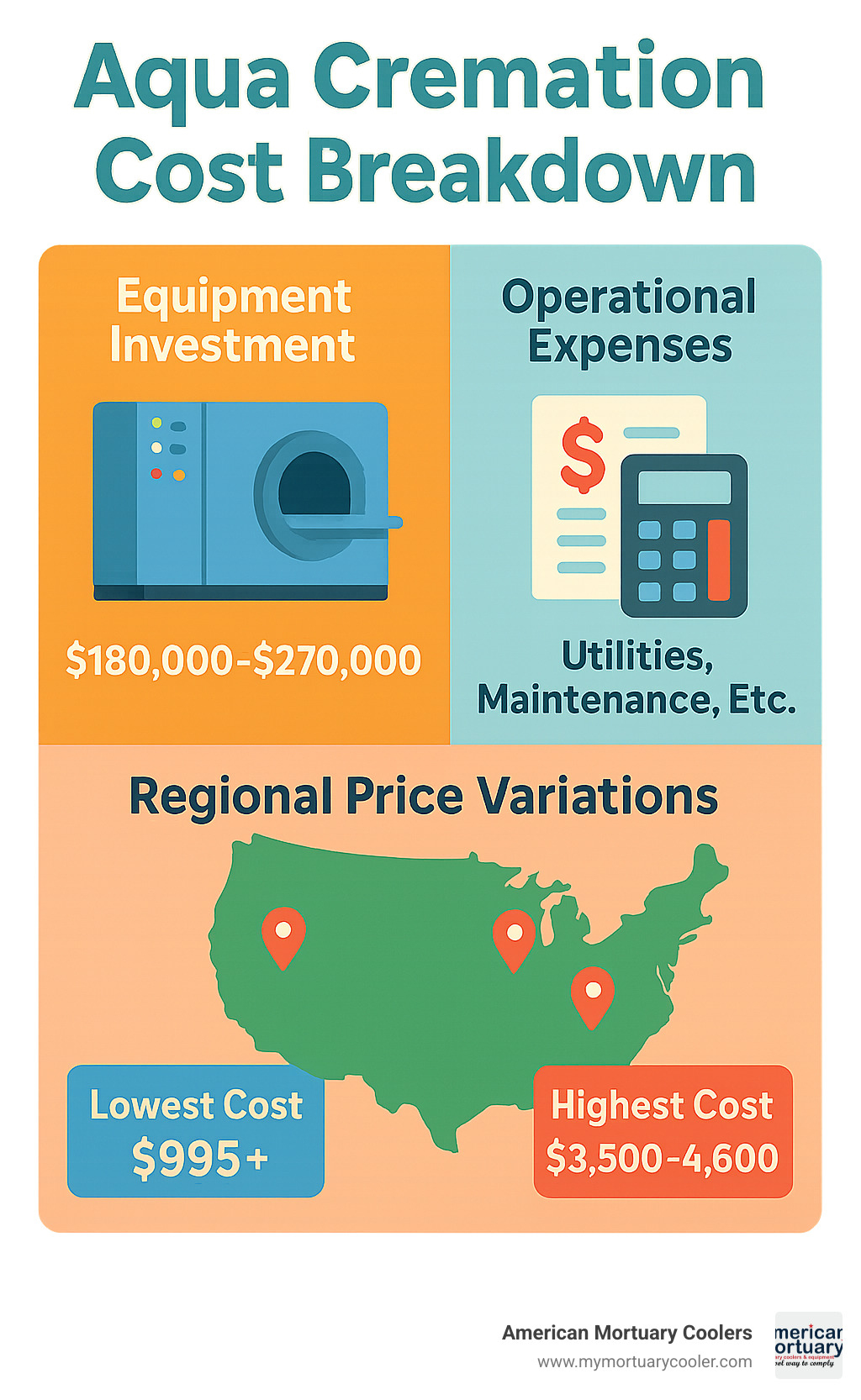
Essential aqua cremation cost terms:
- Eco-friendly funeral options
- how do you get cremated by water
- is water cremation legal in california
What Is Aquamation and How Does It Work?
Aquamation, formally known as alkaline hydrolysis, offers a gentle, water-based alternative to flame cremation. Think of it as working with nature rather than against it. The process beautifully mimics natural decomposition but speeds it up using water, alkaline chemicals (usually potassium hydroxide), gentle heat, and pressure. Here at American Mortuary Coolers, we've noticed growing curiosity about this technology as we work with funeral homes from coast to coast.
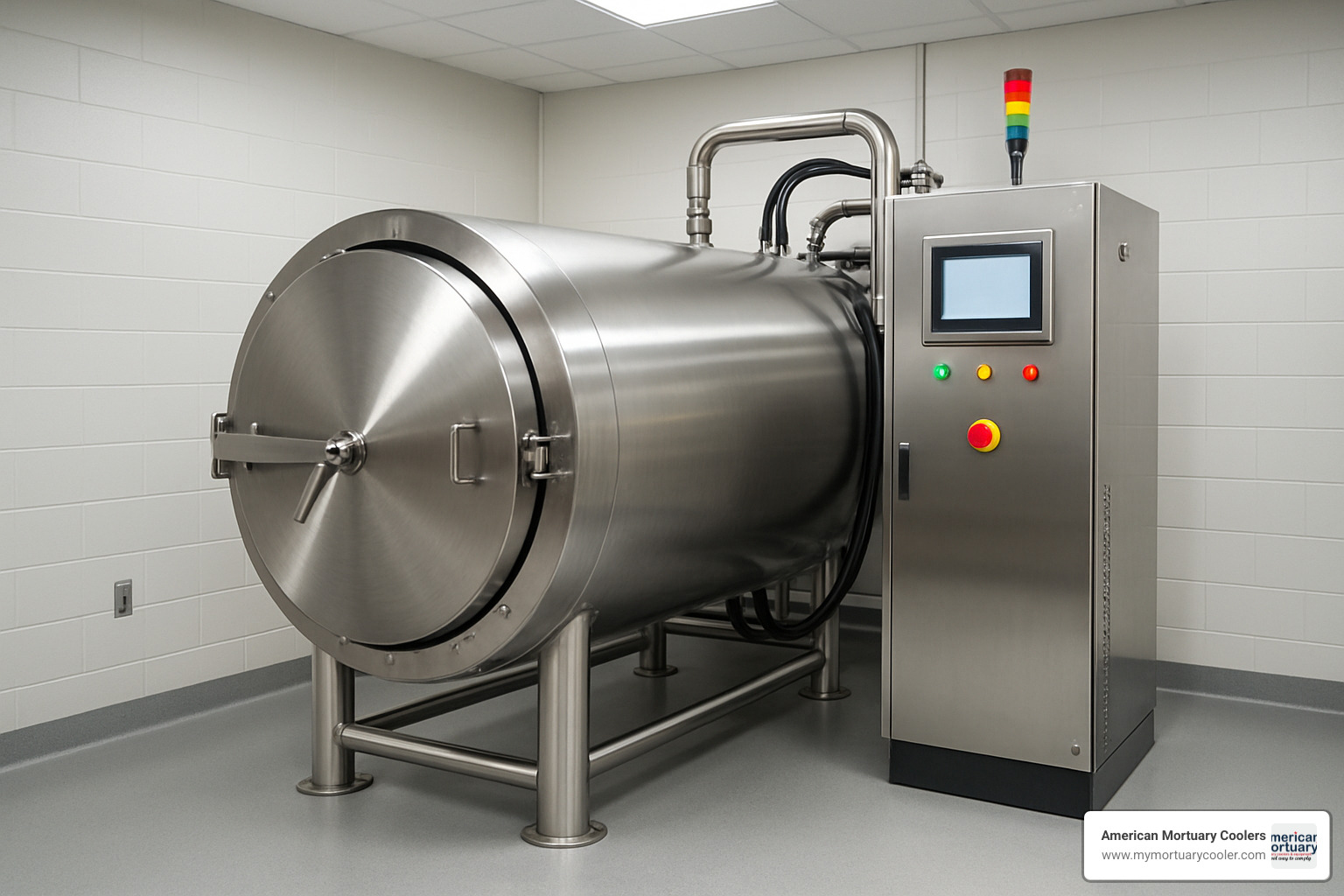
Don't let the scientific name intimidate you—the concept is beautifully simple. Since our bodies are about 65% water, aquamation essentially returns us to our natural elements through water instead of fire. The solution used is 95% water and 5% alkali, creating conditions that respectfully dissolve soft tissues while preserving bone minerals.
One practical advantage affecting aqua cremation cost is that pacemakers and other medical implants can remain in place. Traditional cremation requires surgical removal of these devices to prevent explosions—an additional emotional and financial burden families don't need during such a difficult time.
Scientific research on aquamation benefits confirms what many families tell us: the process leaves a significantly smaller environmental footprint while providing about 20% more remains compared to flame cremation—a meaningful difference for many.
Step-by-Step Process
The aquamation journey unfolds with dignity and care:
First, the body is gently wrapped in a silk or wool shroud—no combustible container needed as with flame cremation. The shrouded body is then carefully positioned on a metal tray and placed into a purpose-built stainless steel vessel.
Once inside, the chamber fills with water and potassium hydroxide solution before being securely sealed. The vessel warms to approximately 160°C (320°F) under pressure for 6-8 hours, though some facilities prefer a gentler approach using lower temperatures around 98°C (208°F) for a longer duration of 14-16 hours.
When the cycle completes, only bone minerals remain. These are respectfully rinsed with fresh water, dried, and processed in a cremulator to create a fine, white powder—similar to the final step of traditional cremation. Finally, these remains are placed in an urn and returned to the family.
The remaining liquid—a sterile solution containing amino acids, peptides, sugars, and salts—flows through normal wastewater treatment systems, where it's filtered and returned to the ecosystem, completing nature's cycle.
Environmental Advantages
When weighing aqua cremation cost against traditional methods, the environmental benefits often justify the difference for environmentally conscious families:
The energy efficiency is remarkable—aquamation uses approximately 90% less energy than flame cremation, dramatically reducing the carbon footprint of end-of-life services. Unlike traditional cremation, which releases greenhouse gases and vaporizes mercury from dental fillings into our air, aquamation produces no direct emissions.
Despite being water-based, the process typically uses less water than a single household consumes in one day. The nutrient-rich effluent can even be beneficially used as fertilizer in some applications, beautifully completing a natural cycle. Plus, dental amalgams containing mercury are captured rather than vaporized, preventing harmful airborne pollution.
As we supply mortuary equipment to funeral homes across America—from the Midwest to the Northeast and Pacific regions—we've witnessed how these environmental advantages are driving adoption despite the higher initial aqua cremation cost. Families increasingly tell us that knowing they've chosen a gentler option for their loved one and for the planet brings unexpected comfort during a difficult time.
More info about Water Cremation: Redefining End-of-Life Care
Aqua Cremation Cost Breakdown
When families consider this gentle alternative to flame cremation, understanding what goes into the aqua cremation cost can help make a difficult decision a little easier. Across America, prices typically range from $995 to $5,095 – quite a spread that reflects the varying realities of different regions and providers.
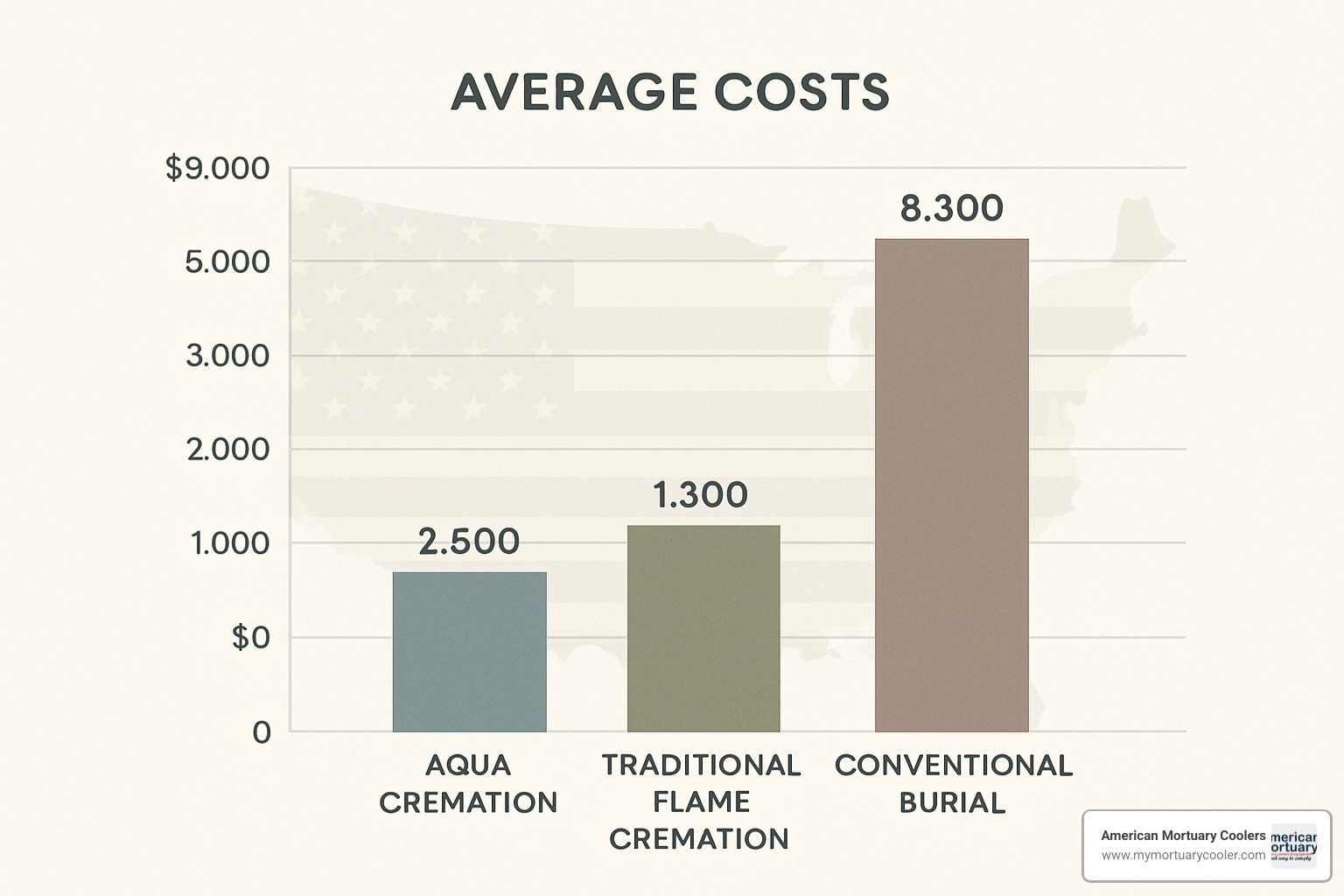
Average aqua cremation cost in the United States
Having worked with funeral homes in nearly every corner of the country, we've gathered pricing data from over 100 providers across 16 states. The numbers tell an interesting story: the national average aqua cremation cost hovers around $2,500, with a median price of $2,371. This positions water cremation comfortably between traditional flame cremation (averaging $1,600) and conventional burial (with its hefty average of $7,848).
What's fascinating is how dramatically prices vary depending on where you live. In Missouri and Washington, some forward-thinking facilities offer services starting under $1,000 – making them the budget-friendly champions of aqua cremation. The middle ground includes states like Illinois, where the median price of $1,497 sits a welcome 37% below the national median, and North Carolina with its moderate pricing structure.
At the premium end, California leads with a median price of $3,950 (a substantial 67% above the national median), with Vermont not far behind. In these states, expect to pay north of $4,000 for the service.
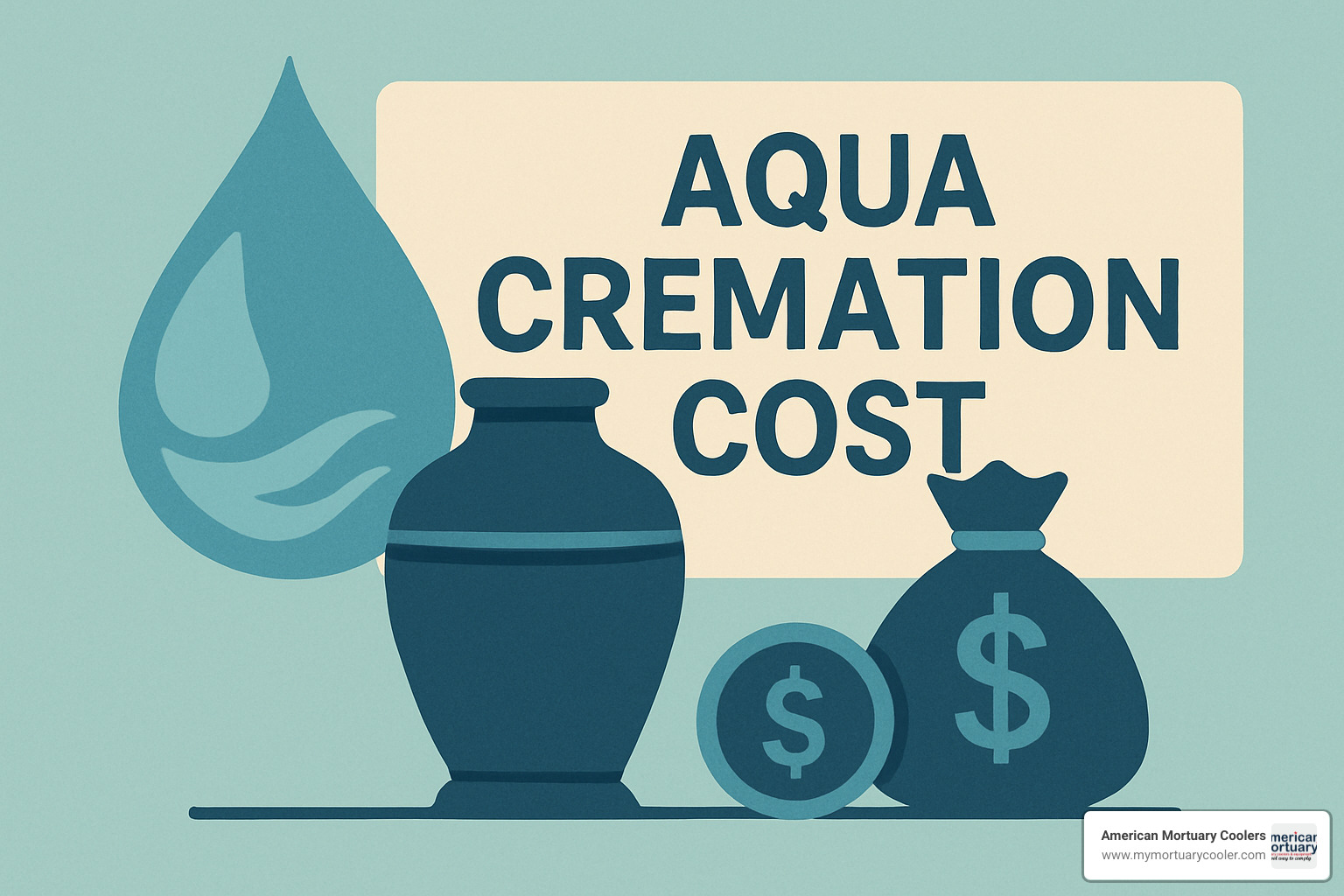
These price differences aren't arbitrary. In our years supplying equipment across the country, we've noticed that early-adopter states often start with higher prices until more providers enter the market. Other factors include local utility rates, regulatory requirements, and simple economics of supply and demand.
Hidden fees that inflate aqua cremation cost
When comparing quotes, it's important to know what might not be included in that base price. We always encourage our funeral home partners to be transparent about these potential extras – after all, the last thing a grieving family needs is surprise charges.
Transportation fees often catch families off guard. While most providers include pickup within 30-50 miles, venturing beyond that radius typically incurs charges of $2-$4 per mile. If there's a delay before the process can begin, refrigeration fees of $50-$100 per day might apply.
Families wishing to witness the beginning of the process (an increasingly common request) may face witnessing fees of $100-$300. Need the process completed quickly? Expedited service generally adds $200-$500 to the bill. And while basic containers are typically included, premium urns start around $50 and can run into hundreds of dollars for artistic or custom designs.
Don't forget about death certificates – official copies cost $10-$25 each depending on your state, and you'll likely need several for handling affairs. Finally, if your chosen funeral home outsources to another facility (quite common in this emerging field), expect some markup fees in the final bill.
Low-budget options & discounts
We understand that end-of-life expenses can create financial strain during an already difficult time. Fortunately, there are several ways to manage aqua cremation cost without compromising on this eco-friendly choice.
Some families find significant savings by crossing state lines. For instance, California residents might reduce costs by arranging services in Washington. Direct aquamation packages – similar to direct cremation – strip away ceremonial elements to focus solely on the disposition process, often at substantial savings.
Many providers offer payment plans that allow families to spread costs over time rather than facing a large lump sum. For veterans, VA burial allowances can help offset expenses, while the Social Security death benefit provides a modest $255 to qualified survivors.
In certain states, Medicaid may cover a portion of disposition costs for eligible individuals. We've been particularly impressed by funeral homes in our Southeast and Southwest service regions that have created innovative pricing tiers to make this eco-friendly option accessible to more families.
At American Mortuary Coolers, we're committed to helping funeral homes across the country implement aquamation technology efficiently, which ultimately helps keep costs reasonable for the families they serve.
More info about cost of water cremation
Price Factors & State-by-State Variations
When families research aqua cremation cost, they quickly find a patchwork of prices across the country. This variation isn't random—it reflects a complex interplay of legal status, equipment economics, and regional factors. As of 2024, while alkaline hydrolysis is legal in 28 states, it's only operational in 17, creating a supply-demand imbalance that significantly impacts pricing.
During our years helping funeral homes set up aquamation facilities, we've watched this eco-friendly option gradually expand across America, with each state developing its own unique pricing ecosystem.
Equipment & Facility Economics
Behind every aqua cremation cost quote is the substantial investment funeral homes make to offer this service:
The aquamation equipment sitting in a funeral home represents a major financial commitment—typically $180,000 to $270,000, compared to about $130,000 for traditional flame cremation systems. At American Mortuary Coolers, we've guided funeral directors from Montana to Florida through these significant purchases, helping them understand the long-term economics.
This higher upfront investment naturally translates to higher per-case fees, especially since these specialized machines process fewer cases than traditional cremation equipment. The 6-8 hour cycle time (versus 2 hours for flame cremation) means each machine can handle fewer families per day, affecting the bottom-line economics.
Maintenance isn't simple either. These sophisticated systems require specialized care, regular maintenance, and occasionally, repairs from technicians who understand the technology. Staff need specific training to operate the equipment safely and efficiently, adding another layer of investment.
Many funeral homes also face significant facility modifications—improved plumbing, electrical upgrades, and sometimes structural changes—before they can even install their new system. All these factors help explain why the aqua cremation cost typically exceeds traditional cremation, despite using less energy once up and running.
State-by-State Snapshot of aqua cremation cost
Having supplied equipment to funeral homes nationwide, we've observed fascinating regional patterns in aqua cremation cost:
Missouri stands out as the budget-friendly champion, with services starting at just $995. The Show-Me State's combination of higher competition and lower operational costs creates a more accessible market for families.
Washington follows closely in affordability, with prices hovering around $1,200 and sometimes dipping below $1,000, making the Pacific Northwest a bright spot for budget-conscious families seeking eco-friendly options.
Illinois offers surprisingly reasonable rates at a $1,497 median—a full 37% below the national average—demonstrating how multiple providers in a market can benefit consumers.
Alabama, North Carolina, and Idaho cluster around the national average, with costs of $2,100, $2,200, and $2,400 respectively.
States like Maine ($2,700), Colorado ($2,800), and Oregon ($2,600) sit slightly above the median, reflecting their regional economic patterns and moderate competition levels.
California tops the chart with a median price of $3,950—a whopping 67% above the national median. This premium pricing stems from the Golden State's limited facilities, strict regulations, and higher operational costs.
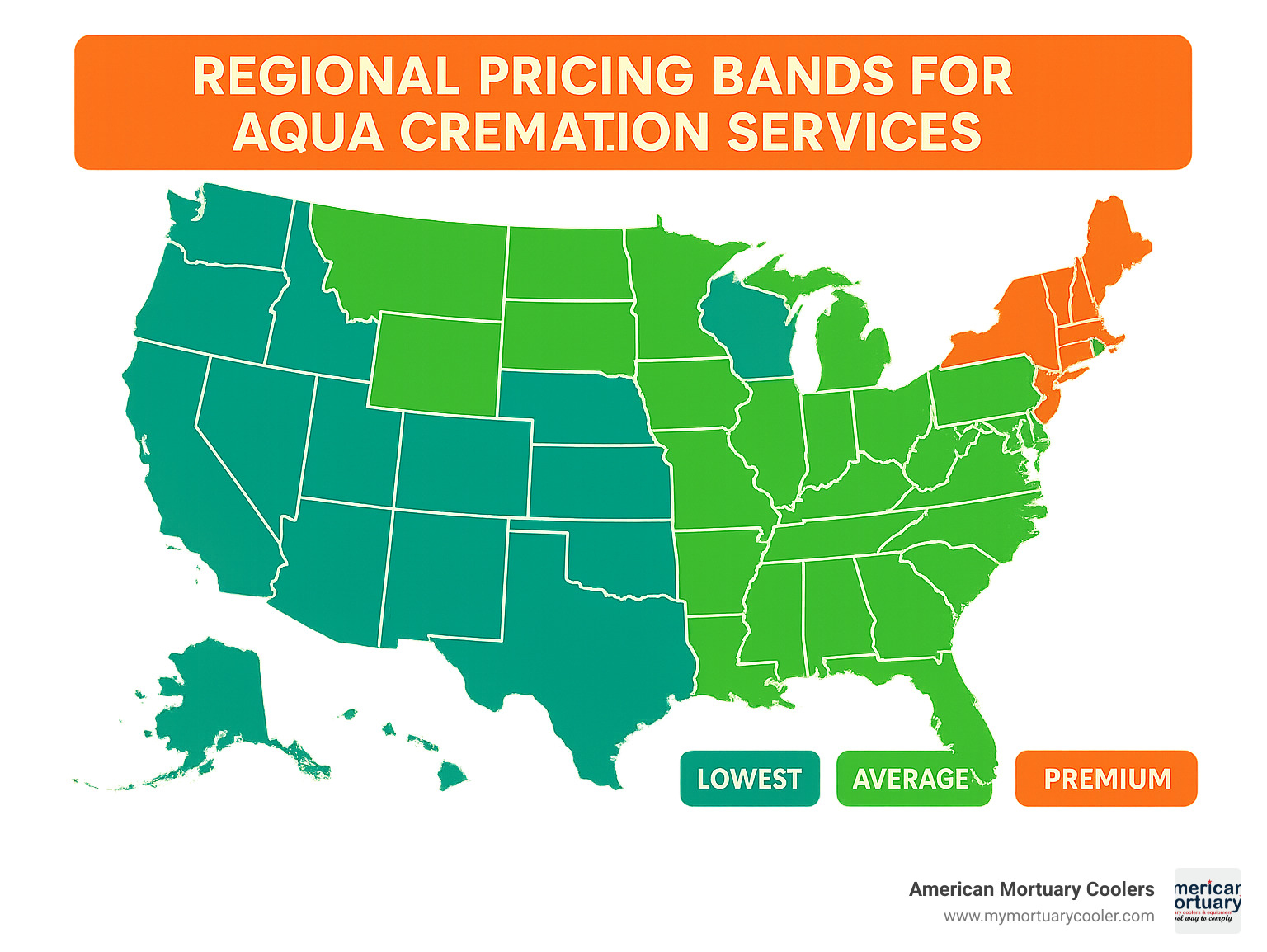
We've noticed a clear pattern in our work across regions: states with only one provider typically charge significantly more than those with multiple competing facilities. This market dynamic creates "pricing islands" where families might save thousands by traveling to a neighboring state for services.
The aqua cremation cost landscape continues to evolve as more funeral homes adopt this technology. As equipment suppliers with a nationwide presence, we're watching prices gradually stabilize in mature markets while newer regions experience the typical premium pricing of early adoption.
Aquamation vs. Traditional Options: Cost & Environment
When families sit down to consider final arrangements, both cost and environmental impact often weigh heavily on their minds. As we've seen at American Mortuary Coolers while supporting funeral homes across the country, more people are asking tough questions about their ecological footprint—even at life's end.
The aqua cremation cost generally runs about $2,500 on average, positioning it between traditional flame cremation ($1,600) and conventional burial (starting around $7,848). This middle-ground pricing reflects its balanced approach to disposition:
| Disposition Method | Average Cost | Energy Use | Carbon Footprint | Average Remains Returned |
|---|---|---|---|---|
| Aqua Cremation | $2,500 | 1/8 of flame cremation | 1/10 of flame cremation | 20-30% more than flame |
| Flame Cremation | $1,600 | 8x more than aquamation | 10x more than aquamation | 20-30% less than aqua |
| Traditional Burial | $7,848+ | Highest (casket production, vault, maintenance) | Highest (formaldehyde, casket materials) | N/A |
The numbers tell a compelling story. While aquamation might cost more upfront than flame cremation, its environmental benefits are substantial. A single flame cremation releases about 573 pounds of carbon dioxide, while aquamation produces virtually no direct emissions. Think of it this way—choosing aquamation over flame is like taking a car off the road for a week.
Traditional burial, though meaningful for many families, comes with significant resource demands. Each year in America, burials use approximately 800,000 gallons of formaldehyde, wood from 4 million acres of forest for caskets, and occupy about 1 million acres of cemetery land. That's a lot of resources for a final farewell.
Why aqua cremation is pricier than direct cremation
"Why does water cost more than fire?" It's a question we hear often as we work with funeral homes from Chicago to Dallas. The $500-$900 premium for aqua cremation cost over traditional cremation comes down to several practical factors.
First, the equipment investment is substantial. While a traditional cremation machine might cost around $130,000, aquamation vessels run $180,000-$270,000—nearly double the investment. Funeral homes need to recover these costs through their service fees.
The limited availability also affects pricing. With aquamation legal in only 28 states and operational in just 17, there simply aren't enough providers to create downward price pressure through competition. Many funeral homes don't own their own equipment and must outsource to specialized facilities, adding another layer of cost.
Some providers also position aquamation as a premium eco-friendly option—similar to how organic food commands higher prices in the grocery store. This "green premium" reflects both the actual costs and the perceived value of choosing an environmentally responsible option.
When we consult with funeral homes from our locations in Atlanta to Pittsburgh, we emphasize that these economic realities need to be balanced against growing consumer demand for greener options.
An Essential Guide to Water Cremation Costs
Value-adds that justify the premium
Despite the higher aqua cremation cost, many families find the benefits worth the additional expense. As one funeral director beautifully put it, "Many families prefer the idea of putting Granny in a warm bath rather than a hot fire." This gentler approach brings comfort to loved ones during a difficult time.
Families also receive 20-30% more remains after aquamation compared to flame cremation. This additional volume allows for more sharing among family members or creating multiple memorial locations—perhaps some ashes in a garden at home, some scattered at a favorite fishing spot, and some kept in an urn.
For the environmentally conscious, the reduced carbon footprint provides meaningful emotional comfort. Aqua cremation uses 90% less energy than flame cremation and eliminates the vaporization of mercury from dental fillings, which otherwise would be released into the atmosphere.
Medical implants like hip replacements and pacemakers emerge from the aquamation process sterilized but intact, allowing for metal recycling programs—something impossible with traditional cremation where these items are destroyed.
Some providers improve their offerings with eco-certifications or participation in environmental programs. One funeral home in Oregon plants a tree for every aquamation service, while another in Washington donates to ocean conservation efforts.
In our conversations with funeral directors from Columbia, SC to New York, we've found these value propositions resonate strongly with today's families—particularly those who've lived their lives with environmental values and wish their final act to reflect those same principles.
Frequently Asked Questions about Aqua Cremation Cost
Is aqua cremation available everywhere?
When families first hear about water cremation, they often ask if it's available in their area. The reality is that aqua cremation isn't yet universally accessible. As of 2024, while it's legal in 28 states, it's only operational in 17 of them.
You'll find active aqua cremation services in Alabama, California, Colorado, Florida, Georgia, Idaho, Illinois, Kansas, Maine, Maryland, Minnesota, Missouri, Nevada, North Carolina, Oregon, Texas, Vermont, and Washington.
If you live in a state where aqua cremation cost isn't even a consideration because the service simply isn't available, you still have options. Many families choose to transport their loved one to a neighboring state where the service is legal. We've seen funeral homes develop thoughtful transport packages specifically for this purpose, handling all the logistics so families don't have to steer complex arrangements during their time of grief.
Some funeral homes have also established partnerships with aqua cremation providers in other states, allowing them to offer the service to their clients through outsourcing arrangements while handling all the coordination themselves.
For those passionate about this eco-friendly option, getting involved in advocacy efforts can help expand availability. Several states currently have pending legislation that may bring aqua cremation to more communities in the coming years. At American Mortuary Coolers, we're actively supporting funeral homes across the country as they prepare for these regulatory changes, helping them understand the equipment requirements and facility adaptations needed.
Does insurance or a pre-need plan cover aqua cremation cost?
Good news – in most cases, yes! Standard life insurance policies typically cover aqua cremation just as they would traditional cremation or burial. The key factor is having sufficient coverage to account for the slightly higher aqua cremation cost compared to flame cremation.
Many forward-thinking funeral homes now include aqua cremation in their pre-need planning options. This allows individuals to not only lock in current prices (protecting against future increases) but also specifically document their preference for this gentler method.
If you have final expense insurance – those specialized policies designed specifically for funeral costs – these generally cover aqua cremation as well. However, there are a few important considerations to keep in mind:
Some older pre-need plans may not guarantee pricing for aqua cremation if it wasn't widely available when the plan was established. We've worked with funeral homes who've had to have delicate conversations with families about this reality.
Older insurance policies might have benefit amounts based on traditional cremation costs that don't fully cover the higher aqua cremation cost. In these cases, families may need to supplement the coverage.
Some insurance plans work with specific funeral home networks that haven't yet invested in aqua cremation technology. If this applies to you, you might need to explore options with out-of-network providers.
We recommend checking your existing policies or pre-need contracts specifically for aqua cremation coverage. If it's important to you, consider updating your arrangements to explicitly include this option.
How do families receive the ashes & are they different?
The remains from aqua cremation are noticeably different from those of flame cremation – and many families find these differences meaningful. The most obvious distinction is the appearance: aqua cremation produces a fine, white to light tan powder that looks and feels quite different from the coarser, gray material with larger fragments typically produced by flame cremation.
One aspect families particularly appreciate is the quantity. You'll receive approximately 20-30% more remains from aqua cremation compared to flame cremation. This additional volume can be especially meaningful for families wishing to divide ashes among several relatives or create multiple memorial locations.
The texture is generally finer and more uniform, which some families find provides a sense of gentleness that aligns with their feelings about their loved one's final disposition. Because of the increased volume, you may need slightly larger urns or containers – something to keep in mind when selecting memorial vessels.
The process for returning remains follows the same respectful protocols as traditional cremation. Your funeral home will place the processed remains in either a temporary container or your chosen urn. They'll then arrange for you to receive the remains, either through pickup or delivery, accompanied by a certificate of cremation documenting the process.
In our years of working with funeral homes from Tennessee to California, we've heard countless stories of how meaningful these differences can be. Many families tell us they appreciate that aqua cremation cost includes this additional volume of remains, allowing grandchildren, siblings, and other loved ones to each have a memento if desired.
More info about aquamation equipment & essential supplies
Conclusion
Making end-of-life arrangements is deeply personal, and understanding the financial aspects helps families make informed choices that align with their values. Throughout this guide, we've seen that aqua cremation cost typically falls between $995 and $5,095 across the country, with those regional differences reflecting everything from local competition to operational expenses.
Yes, you'll generally pay about $500-$900 more than traditional flame cremation—but many families tell us the environmental benefits and gentler approach make that difference worthwhile. It's a bit like choosing organic produce; there's a premium for something that treads more lightly on our planet.
When you're exploring aquamation for yourself or a loved one, here are some friendly suggestions from someone who's helped funeral homes steer these waters for years:
Compare quotes from multiple providers—I've seen prices vary by over $1,000 in the same city! Don't be shy about calling around. This isn't like shopping for a car where haggling is expected, but being an informed consumer matters.
Always ask what's actually included in the quoted price. Is transportation covered? What about the urn? Those "little extras" can add up quickly during an already emotional time.
If aquamation isn't available locally (remember, it's only operational in 17 states right now), consider providers in neighboring states. Some families find the additional travel costs still result in overall savings.
For environmentally-conscious families, ask for specific metrics about the ecological benefits. How much energy is saved? What emissions are avoided? These concrete numbers can provide comfort during a difficult time.
Don't forget to check whether existing insurance policies or pre-need funeral plans cover aquamation. Most do, but it's always best to verify rather than assume.
Here at American Mortuary Coolers, we feel privileged to support this growing movement toward greener end-of-life options. Our custom mortuary coolers and specialized equipment serve as the foundation for new aquamation facilities from coast to coast. From our regional bases serving the Midwest to the Pacific coast, we're working with funeral directors who are responding to families seeking alternatives.
The landscape is changing quickly. As more providers enter the market and technology evolves, we expect the aqua cremation cost to become more competitive. The current premium reflects not just the higher equipment investment but also the value many families place on choosing a farewell that's gentler on both their loved one and our shared environment.
After all, how we say goodbye matters—to us, to those we love, and to the world we leave behind.


















